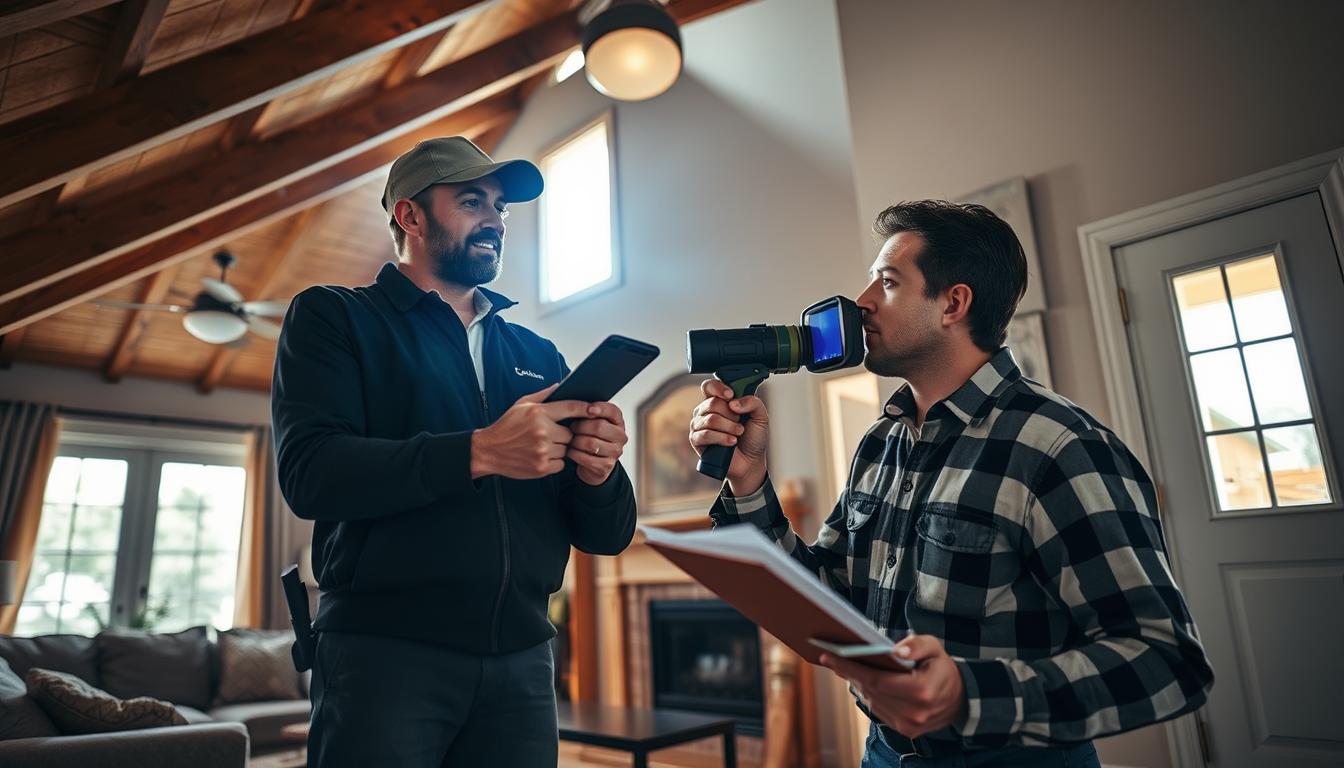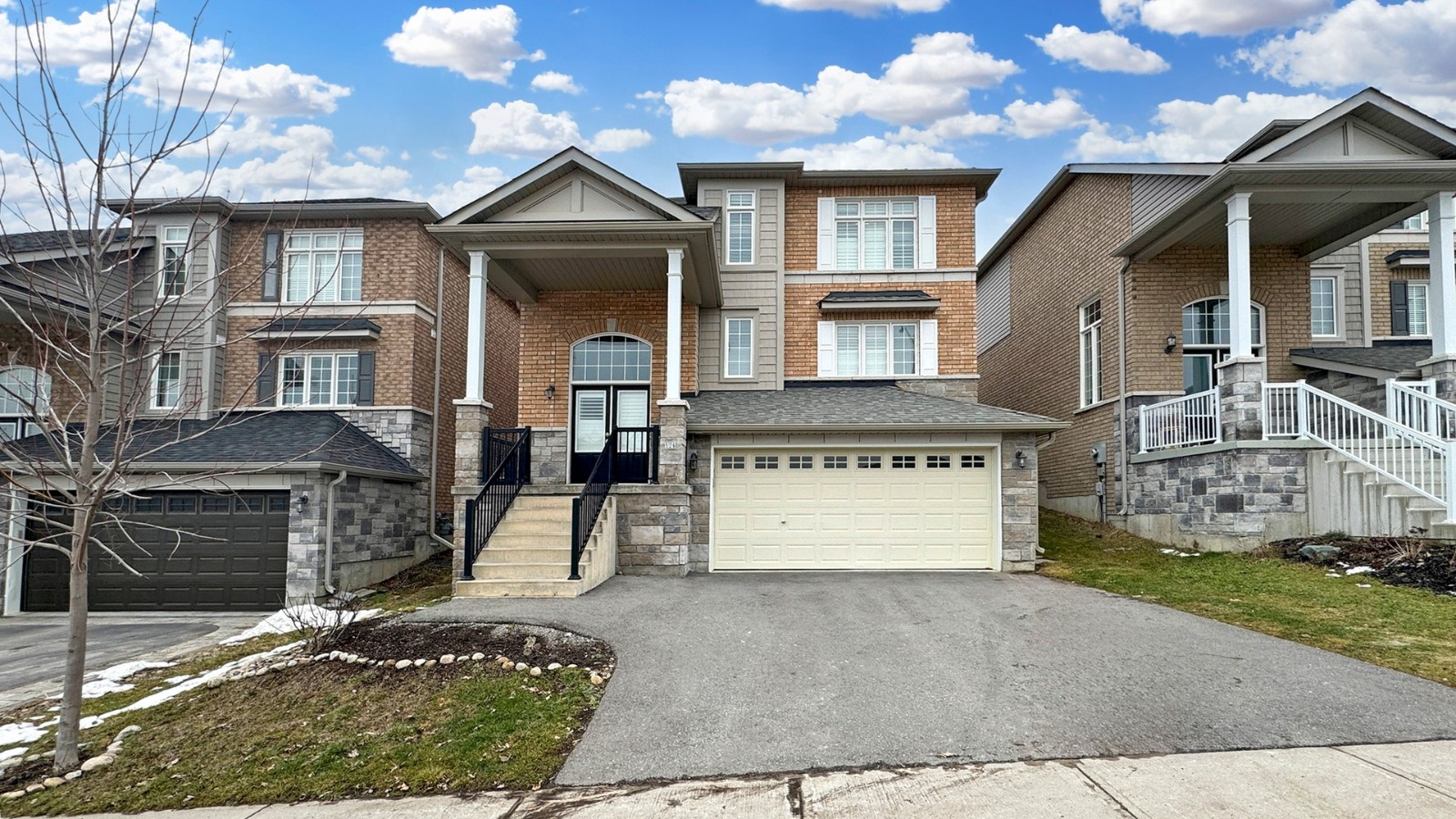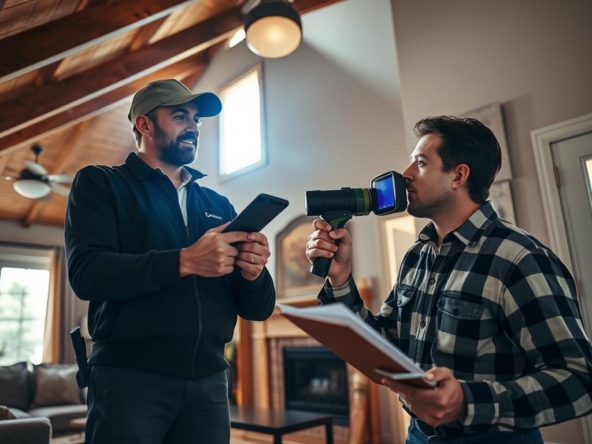As a buyer, knowing about the home inspection process is key. It helps you make a smart choice when buying a property. A home inspection checks the property’s condition, spotting any problems or defects.
This step is vital in the buyer’s guide to buying a property. It gives buyers the info they need to feel confident during the process.

Knowing what a home inspection entails can save you from unexpected costs later. The buyer’s guide to home inspections shows how crucial this step is. It ensures buyers are well-prepared and informed for their new home purchase.
Understanding the home inspection process is essential for a smooth and worry-free buying experience.
Key Takeaways
- Understanding the home inspection process is essential for buyers
- A home inspection is a thorough examination of a property’s condition
- The home inspection process is an important step in the buyer’s guide
- Buyers can avoid costly surprises by knowing what to expect from a home inspection
- The buyer’s guide to home inspections provides valuable information for buyers
- Understanding the home inspection process ensures a successful and stress-free purchase
What Is a Home Inspection and Why It Matters
A home inspection checks a property’s condition, finding any issues or defects. It’s key for buyers, giving them a full view of the property they’re about to buy. This helps buyers make smart choices, avoiding unexpected costs later.
Real estate inspections reveal problems like structural damage, electrical issues, or plumbing problems. This info can help buyers talk about repairs or credits. This way, buyers can get a better deal. Home inspections offer peace of mind, save money, and make buying smoother.
- Examining the property’s foundation and structural elements
- Evaluating the electrical and plumbing systems
- Inspecting the roof, walls, and ceilings for damage or wear
Understanding home inspections is key for buyers. They offer insights, helping buyers make smart choices and avoid problems.
| Home Inspection Benefits | Description |
| Peace of Mind | Knowing the property’s condition before purchase |
| Financial Savings | Avoiding costly repairs and surprises |
| Smarter Negotiations | Using inspection results to negotiate repairs or credits |
Timing Your Home Inspection Right
Timing is key when buying a home. This is especially true for the home inspection timeline. A good inspection scheduling plan helps you understand the property’s condition before you buy.
To start, coordinating with the seller and inspector is crucial. You can do this by making a list of important tasks. These include:
- Scheduling the inspection at a time that works for everyone
- Making sure the inspector can access all parts of the property
- Reviewing the report and asking any questions you have
The home inspection timeline varies based on the property’s complexity and the inspector’s schedule. Most inspections take a few days to a week. It’s important to choose a reliable inspector who can give you a detailed report and help with the inspection scheduling process.
Timing your home inspection correctly helps you avoid unexpected costs. It ensures you make a well-informed decision when buying your dream home. Stay organized, ask questions, and focus on your needs during the home inspection timeline and inspection scheduling process.
Essential Components of Home Inspections as a Buyer
Home inspections cover several key areas. Knowing these can help buyers feel more confident during the process. These areas include the property’s structure, electrical systems, plumbing, and HVAC systems. A detailed checklist ensures no part of the property is missed.
Understanding home inspections is crucial for buyers. They check the property’s systems and structures. This includes the foundation, roof, walls, and floors. They also look at the electrical and plumbing systems.
Structural Elements Assessment
This part of the inspection checks the property’s foundation, walls, and roof. Buyers should watch for damage or wear, like cracks or leaks.
Electrical System Evaluation
Checking the electrical systems is vital for safety and function. Inspectors look at circuit breakers, wiring, and outlets for any hazards.
Plumbing Infrastructure Review
This review looks at the water and drainage systems. It checks for leaks, corrosion, or other problems that could affect the property’s value or safety.
HVAC System Analysis
The HVAC system is checked to ensure it works well. This includes the furnace, air conditioner, and ductwork. It’s important for heating, ventilation, and air conditioning.
Common Red Flags to Watch For
When looking at home inspection red flags, buyers need to know about issues that can lower the property’s value and safety. Common problems include water damage, foundation issues, and electrical dangers.
These problems can be expensive to fix and might even harm people’s health. Buyers should look for water damage signs like stains or warped walls and ceilings. They should also check the foundation for cracks or unevenness.
Here are some issues to watch for during a home inspection:
- Water damage or leaks
- Foundation problems or cracks
- Electrical hazards or outdated systems
- Pest or rodent infestations
- Mold or asbestos presence
Knowing about these home inspection red flags and potential issues helps buyers take steps to avoid risks. It’s crucial to have a skilled home inspector to spot these problems and offer advice on fixing them.
Preparing for the Inspection Day
As a home buyer, being ready for the inspection day is key. Good home inspection preparation helps spot potential problems. Start by making an inspection day checklist to stay organized.
A good inspection day checklist includes a camera, notebook, and property documents. Reviewing past inspection reports can also help. Being prepared ensures a detailed and effective inspection.
It’s important to ask the right questions during the inspection. Ask your inspector about:
- What are the most critical issues with the property?
- Are there any potential safety hazards?
- What are the estimated costs of repairs?
By using a detailed inspection day checklist and asking the right questions, you’ll get all the info you need. This helps you make a smart choice about the property.
Understanding the Inspection Report
Getting a home inspection report is key when buying a home. It helps you understand the property’s condition and spot any issues. The report will show the property’s state, pointing out any defects or repairs needed.
A home inspection report can come in various forms, like summary or detailed reports. To grasp the findings, you need to carefully look over the report. It might include photos, videos, and advice on further checks or fixes. By learning how to read the report, you can negotiate repairs or credits with confidence.
Here are some important things to look at in a home inspection report:
- Check for any major defects or safety hazards
- Review the condition of major systems, such as electrical and plumbing
- Look for any signs of water damage or structural issues
- Check the report for any recommendations for further evaluation or repair
By carefully reviewing the home inspection report and understanding the results, buyers can make smart choices. It’s crucial to take your time to thoroughly review the report and ask questions if you’re unsure.
Cost Considerations and Budgeting
When planning for home inspection costs, it’s key to budget wisely to avoid surprises. The price of a home inspection can change based on the property’s location, size, and age. In Canada, the cost usually falls between $300 and $1,000. Knowing these prices helps buyers plan their budgets better.
When setting a budget, remember to include the cost of the inspection and any extra tests. For instance, if the inspector finds a foundation issue, extra tests might be needed. This way, buyers can plan ahead and make a better choice about their home purchase.
Average Inspection Fees in Canada
In Canada, the price for home inspections varies by province and type of inspection. Here are some general price ranges:
- Basic home inspection: $300-$500
- Standard home inspection: $500-$700
- Premium home inspection: $700-$1,000
Additional Testing Costs
At times, extra tests are needed to find home issues. These can include:
- Mold testing: $100-$300
- Septic system inspection: $200-$500
- Well water testing: $100-$300
Understanding home inspection costs and budgeting for them helps buyers make smart choices. It’s important to include the inspection cost and any extra tests in the budget. This ensures a smooth and successful home buying process.
Negotiating Repairs After the Inspection
Negotiating repairs after a home inspection is key. It’s important to understand the process and the main issues. This means negotiating repairs with the seller, which can be tough but necessary. The aim is to find an agreement that works for both sides, fixing any needed repairs or concerns.
To do well in this, buyers should focus on the most important problems. These are the ones that really matter for the property’s value or safety. This
priority assessment
helps buyers know which repairs to ask the seller for. It helps protect their interests and makes sure the property is sound before they buy it.
Buyers should keep these points in mind:
- Look over the inspection report for any issues
- Think about the cost of repairs and how they fit into the negotiation
- Talk clearly with the seller to find an agreement that works for both
Knowing how to negotiate repairs and being ready for inspection negotiations helps buyers feel confident. It’s also good to know the
legal considerations
that come up, like the seller’s duty to reveal known problems or the buyer’s right to ask for fixes.
The secret to good inspection negotiations is understanding the problems and being willing to work with the seller. This way, you can find a solution that works for everyone.
| Issue | Priority | Cost |
| Structural damage | High | $10,000 |
| Electrical issues | Medium | $5,000 |
| Cosmetic damage | Low | $2,000 |
Selecting a Qualified Home Inspector
Choosing a qualified home inspector is key for a detailed and accurate check. They can spot potential problems and offer insights. This helps buyers make smart choices. Look for their professional certifications, experience, and insurance.
A good home inspector has certifications from groups like the Canadian Association of Home and Property Inspectors (CAHPI). These show they know their stuff and keep up with new rules. Also, pick someone with lots of experience. They know common issues and local building codes well.
Key Qualifications to Look For
- Professional certifications from reputable organizations
- Extensive experience in the field
- Insurance coverage for errors and omissions
By picking a skilled home inspector, buyers get a full and correct check. This gives them the info to make smart buying choices. Remember, a good home inspector is vital in the buying process. They can save you from big surprises later.
Conclusion: Making Informed Decisions Through Professional Home Inspections
As you near the end of buying a home, the value of a professional home inspection is clear. Working with a skilled home inspector helps you make smart choices. This ensures your investment is safe and you feel secure.
A home inspection is more than a formality. It’s a key step to understanding the property fully. This way, you can avoid unexpected costs and choose a home that fits your budget and future plans. Follow the advice in this article to confidently go through the home inspection process and pick the right home for you.
FAQ
What is the purpose of a professional home inspection?
A professional home inspection checks a property’s condition. It finds any problems or defects. This helps buyers know what they’re getting into before they buy.
What are the key benefits of a home inspection for property buyers?
Home inspections help buyers understand a property’s condition. They find out if repairs are needed. This information can help buyers negotiate or avoid surprises later.
What are the legal aspects of home inspections in Canadian real estate?
In Canada, home inspections are key in buying a home. Buyers can get a professional inspection. The report can help negotiate repairs or credits with the seller.
When is the best time to schedule a home inspection?
Schedule a home inspection soon after an offer is accepted. But before the closing date. This gives time to review the report and negotiate repairs.
What are the essential components of a home inspection that buyers should be aware of?
A home inspection checks the structure, electrical systems, plumbing, and HVAC. These checks are crucial for understanding the home’s condition and any issues.
What are some common red flags that buyers should watch for during a home inspection?
Watch for water damage, foundation problems, electrical hazards, and HVAC issues. These are signs of potential big problems that need attention.
How should buyers prepare for the home inspection day?
Bring a camera, notebook, and any important documents. Also, have questions ready for the inspector. This ensures you understand the property’s condition fully.
How can buyers understand the home inspection report?
Understand the report by interpreting the findings and identifying issues. Prioritize repairs or maintenance. Review the report carefully and ask for clarification if needed.
What are the typical costs associated with a home inspection in Canada?
Home inspections in Canada cost between $300 to $500. The price depends on the property’s size and complexity. Additional tests, like for radon or mold, may also be needed.
How can buyers effectively negotiate repairs with the seller after the home inspection?
Prioritize repairs based on their severity and importance. Work with the seller to find a solution. Consider legal aspects and the deal’s impact.
What should buyers look for when selecting a qualified home inspector?
Look for certified, experienced inspectors with good insurance. Check their reputation and reviews. This ensures they’re qualified and reliable.
Your Trusted Real Estate Agent in Toronto
Looking for expert assistance to buy or sell your property in Toronto? Contact us today to work with a professional real estate agent who knows the market inside and out!
Get in TouchBusiness Contact Details
- Address: 305 Milner Ave Unit # 312, Toronto, ON M1B 3V4, Canada. Get Direction - Google Map
- Contact Name: Sivage Sivagumaran
- Phone: +1 416-553-8902
- Email: sivagehomes@sivage.ca
Visit our website at SivageRealty.ca for the latest property listings and personalized services. Let us help you turn your real estate goals into reality. Your dream property is just a call away!
Disclaimer:
The content provided in this blog is for informational purposes only. We recommend consulting with a qualified professional before making any decisions based on the information provided. If you have any questions or concerns, please don't hesitate to reach out to us. Our contact information is available on the Contact page.




